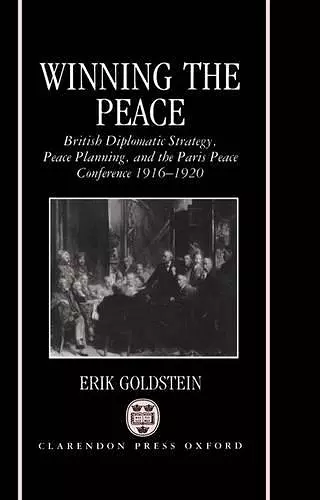Winning the Peace
British Diplomatic Strategy, Peace Planning, and the Paris Peace Conference 1916-1920
Format:Hardback
Publisher:Oxford University Press
Published:30th May '91
Currently unavailable, and unfortunately no date known when it will be back

The Paris Peace Conference marked a turning-point in international history generally, and for the British Empire in particular. This book studies the evolution of British plans for the peace settlement following the First World War. The introduction of expert advisers into the foreign policy process was a critical innovation. Some perceived new imperatives for the age, others remained wedded to traditional beliefs. Erik Goldstein shows that the handful of individuals closely involved in the formulation of foreign policy succeeded in creating a coherent diplomatic strategy. He examines the growth of government planning and the changing relations between the Civil Service and ministers. He analyses the considerable influence of the little-studied Political Intelligence Department, whose members included Arnold Toynbee, Lewis Namier, Harold Nicolson, Alfred Zimmern, and Robert Vansittart. This detailed study of the Paris Peace Conference and its background makes a significant contribution to our understanding of twentieth-century European history.
`The book is a rewarding and dense study of the subject, particularly good for its analysis of minor novelists, both of the early part of the century, and its end.^' Irish Independent
` ... this is a worthy contribution to the history of the Foreign Office.' David Longley, History
`...his chapter on the formation of the Political Intelligence Department is particularly illuminating, and adds substantially to P.M. Taylor's earlier work on the subject. ...This is both a good and an important book. Goldstein's research is meticulous, his organization sensible, his judgements sound and his conclusions judicious. The topic is a valuable one, ...' Keith Neilson, Canadian Journal of History
'This is a full and useful account, well and widely researched. It breaks important new ground.' A. Lentin, The Open University, Diplomacy & Statecraft, Vol. 3, No.3, Nov '92
'This is an engaging book, elegantly written, and with enough fresh information to keep the reader turning the pages eagerly.' George Egerton, University of British Columbia, Albion, Winter '92
'Goldstein's study shows how comprehensively the challenge of peace was viewed in Britain, as elsewhere, at the end of the First World War.' Leo Haupts, University of Cologne, German Historical Institute London Bulletin, Volume XV, No. 2, May 1993
'The net effect is that of bringing out fresh highlights in an existing tapestry without much altering its familiar features and overall design ... informative book.' D.N. Lammers, Michigan State University, American Historical Review
'The book ... is full of carefully studied generalizations about a wide range of European and imperial problems of peacemaking from the British perspective. It is impressively researched and, given its subject, presented with remarkable clarity ... it will become a standard work among diplomatic historians.' James D. Stuart, Valparaiso University, The Historian, Vol. 55, No. 4, Summer '93
'well-documented and ably argued book' Trevor Wilson, University of Adelaide, The International History Review, XVI:I:February 1994
ISBN: 9780198215844
Dimensions: 223mm x 143mm x 24mm
Weight: 545g
328 pages